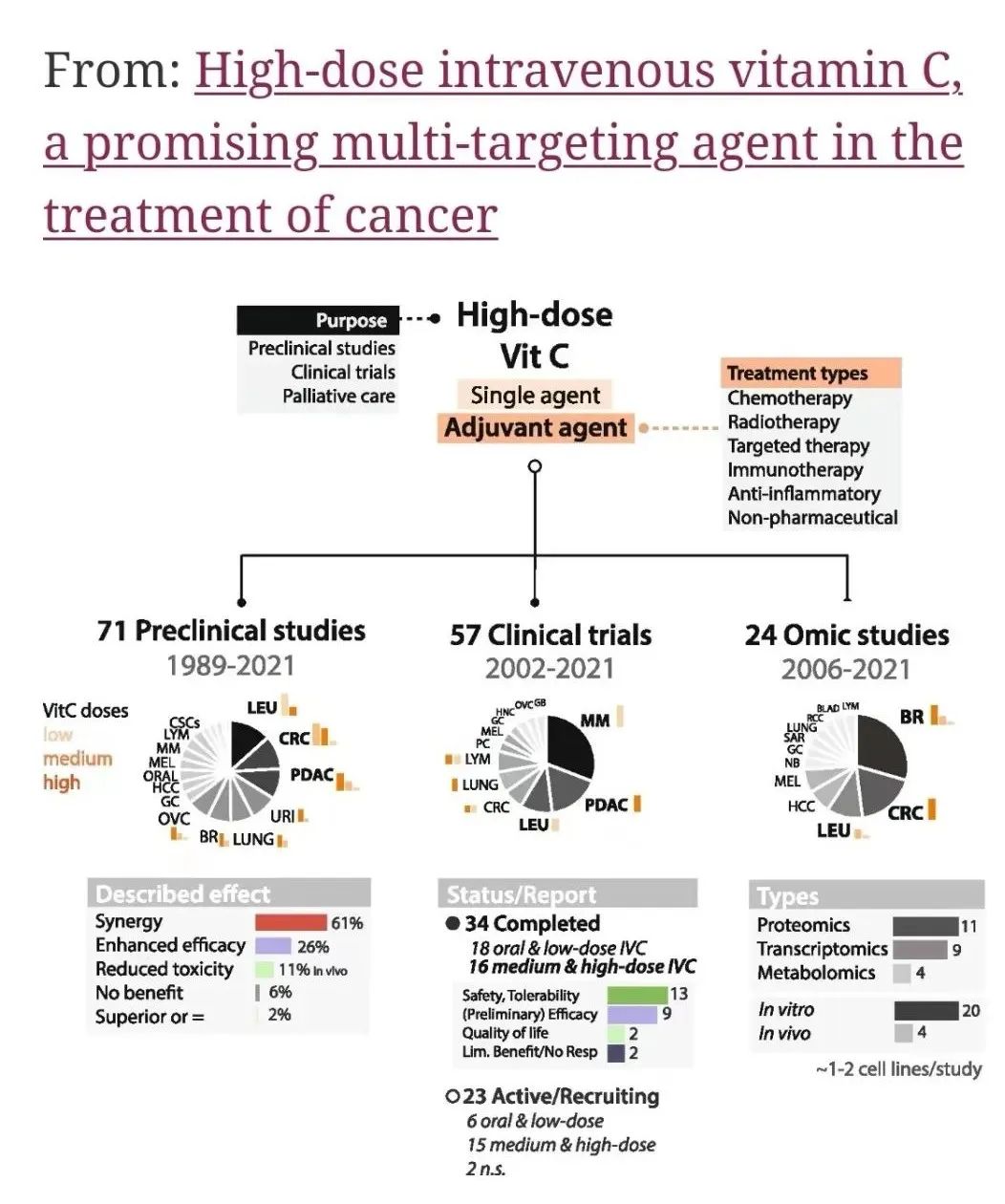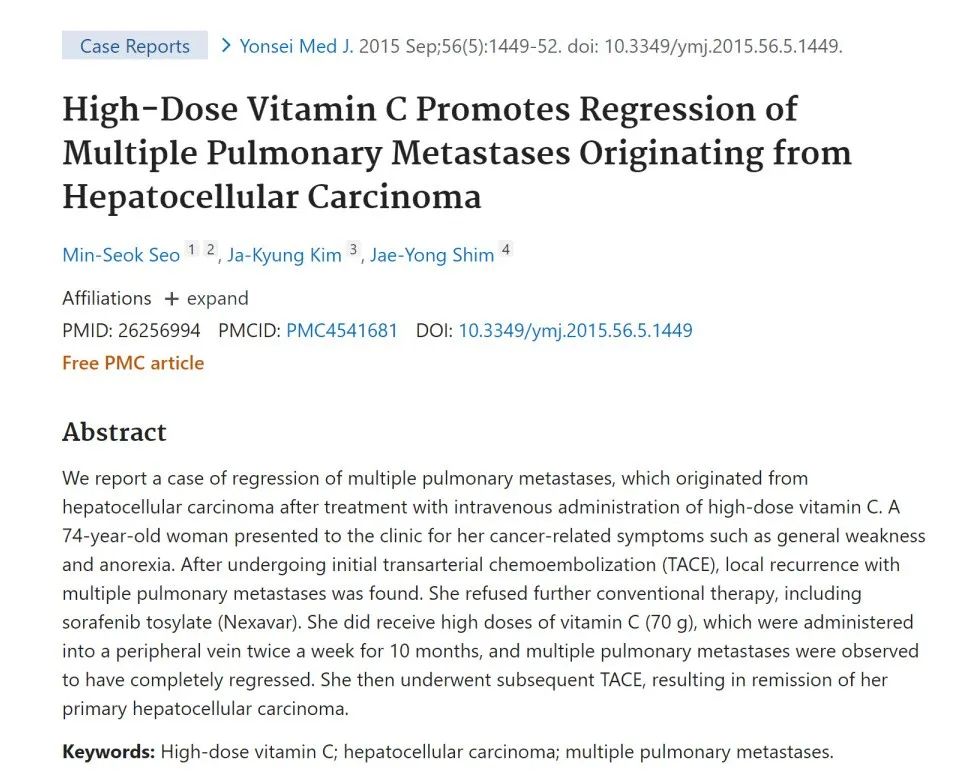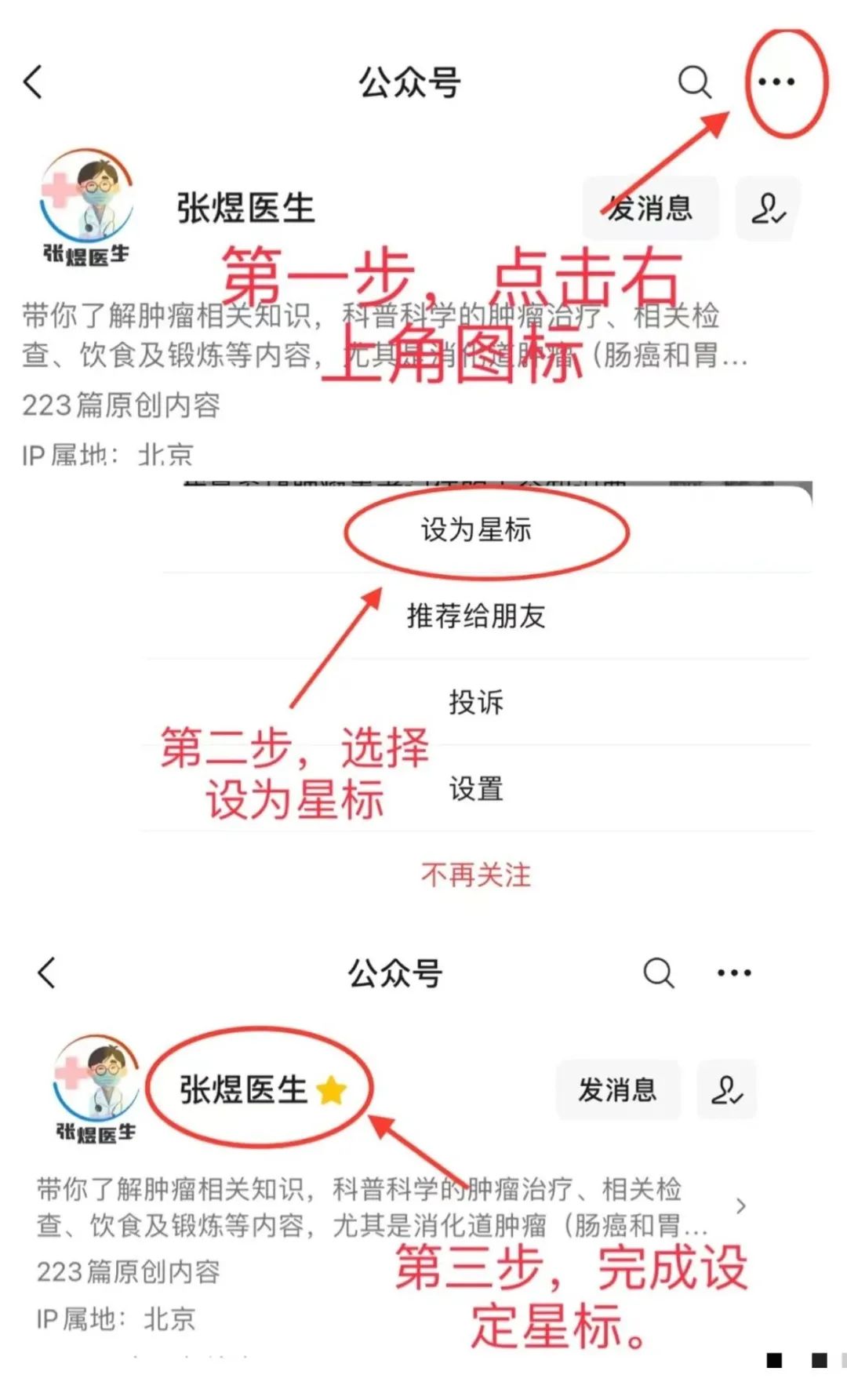
Medical researchers are not only continuously developing new anti-tumor drugs but are also trying to find new uses for old drugs, hoping to alleviate the suffering caused by cancer and extend survival. High-dose vitamin C treatment for cancer is one of these methods, which is still under research.
Many people may wonder how vitamin C, an essential water-soluble vitamin for the human body, can be used to treat cancer. How can it possibly kill cancer cells?
In fact, there is theoretical support for the use of high-dose vitamin C in treating advanced cancer, along with clinical trial evidence.
There are many proposed theories, one of which is: At lower concentrations, vitamin C primarily acts as an antioxidant and can protect cells from oxidative stress, but at higher concentrations, vitamin C acts as a pro-oxidant, inducing oxidative stress and leading to cell death.
It was first in 1971 that Nobel laureate Linus Pauling collaborated with a surgeon to use high-dose vitamin C (>10g/day) to treat cancer. In 1976, they published data from 100 terminal cancer patients treated with high-dose vitamin C. Although the trial design was not very robust, retrospective analysis showed that compared to a control group of 1000 similar patients at the same hospital, the median survival time increased fourfold, and the quality of life improved significantly. 22% of patients in the high-dose vitamin C group survived for one year, while only 0.4% in the control group did.
During the same period, a similar study in Japan reached the same conclusion, which was an encouraging finding. However, don’t rush to conclusions; I have written about the levels of medical evidence, and the results of retrospective analyses can easily be affected by various factors, making them less reliable; Phase III clinical trials are the gold standard.
A heavy blow came. In 1985, Charles Moertel from the Mayo Clinic published an article in the New England Journal of Medicine, conducting a randomized double-blind trial on high-dose vitamin C treatment for advanced cancer, and found it to be ineffective.
Not really. Subsequent analyses revealed significant issues with this randomized double-blind trial, as vitamin C was only administered orally, while Linus Pauling used both intravenous and oral methods. Further research confirmed that oral vitamin C has poor absorption, with peak plasma drug concentrations not exceeding 200uM, far inferior to intravenous administration, which achieves peak concentrations over 25 times higher than oral vitamin C.
Therefore, this clinical trial can only indicate that oral high-dose vitamin C is ineffective, but it cannot conclude that intravenous high-dose vitamin C is ineffective. Many subsequent studies have been conducted, as shown in the following image:

From 1989 to 2021, there have been 71 preclinical studies on high-dose intravenous vitamin C, which found a clear cancer cell-killing effect in in vitro experiments; from 2002 to 2021, there have been 57 clinical trials on high-dose vitamin C, some of which showed that vitamin C is clearly effective and may improve patient immune function, with minimal toxic side effects and good safety. However, due to the existence of negative trial results, this therapy has not been recognized by guidelines and requires further research.
Nevertheless, high-dose vitamin C is not uncommon in real-world use abroad, with literature showing that over 20% of patients with terminal cancer have experimentally received high-dose intravenous vitamin C, and some cases have shown very good efficacy, as shown in the following image:

This is a case report published in 2015 by Yonsei University College of Medicine in Seoul, South Korea:
A 74-year-old patient with advanced hepatocellular carcinoma with multiple lung metastases received high-dose intravenous vitamin C, 70g intravenously twice a week, for 10 months, resulting in complete regression of multiple lung metastases, achieving excellent efficacy.
There are many similar cases, and although they are not enough to draw definitive conclusions, at least this is a safe method with some hope, and it is low-cost. Note that due to its low cost, no manufacturer has the incentive to actively conduct research, including Phase III clinical trials, which is also a significant obstacle to vitamin C research.
However, the credibility of high-dose vitamin C is far higher than that of Qin Caidong’s composition; let’s compare them briefly:
1. The viewpoint of high-dose vitamin C for cancer treatment was proposed by Nobel laureate Linus Pauling, while the composition was proposed by Qin Caidong, a materials science PhD from Oxford.
2. High-dose vitamin C was proposed in the 1970s, and many scientists have conducted research with numerous published data. The composition’s claimed efficacy is solely based on Qin Caidong’s assertions, with no effective data.
3. As shown above, high-dose vitamin C treatment for cancer has 71 preclinical studies from 1989-2021 and 57 clinical studies from 2002-2021, all conducted through rigorous laboratory work, teamwork, and formal approval by national authorities. Qin Caidong’s composition, as far as we know, has zero research.
4. Multiple studies indicate that high-dose vitamin C for advanced cancer has good tolerance, minimal side effects, and can alleviate symptoms, improve quality of life, and prolong life, whereas Qin Caidong’s composition has no credible results and is merely self-promotion and deception of patients.
5. High-dose vitamin C at least uses approved drugs, while Qin Caidong uses dubious substances, even industrial or animal-use reductants, which is a serious joke on patients’ health.
Such a comparison makes the differences clear. Although this therapy has not been recognized by guidelines, when a terminal cancer patient has no other options and wishes to try high-dose intravenous vitamin C, as long as there is adequate communication about potential benefits and risks, do you think it is worth trying?
Due to changes in platform push rules, to avoid missing our meetings, please remember to mark me as a “star”~
